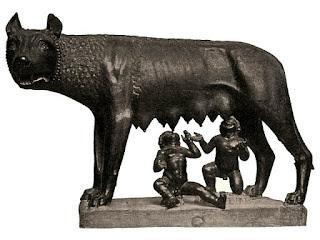The first Valentine cards in the United States were produced right here in Massachusetts by Esther Howland, an enterprising Worcester resident who made her first cards in 1847. She soon couldn't keep up with the demand, hired people to make cards for her, and eventually sold the company and retired on the profits.
People who don't like Valentine's Day disparage it as a "Hallmark Holiday" - a commercial holiday created just so corporations can make some profits. But Hallmark didn't invent the holiday, and neither did Esther Howland. It actually has a long and somewhat murky history. According to Wikipedia (which also can be murky), the first written evidence connecting Valentine's Day and romance comes from "Parlement of Foules," a poem written by Geoffrey Chaucer around 1382. As far as I know, Chaucer didn't work for Hallmark.
No one is really sure why we celebrate love on Valentine's Day. The day is named after one of the several different Saint Valentines, but none of them are famous for being lovers or romantic. One of the Valentine's was supposedly martyred on February 14 by the Romans as part of the Lupercalia festivities.
On every February 14 the Romans celebrated Lupercalia, a holiday devoted to Lupercus, a god with a wolfish name who protected the flocks. Men of noble birth would sacrifice a dog and/or a goat in the cave where Romulus and Remus supposedly were suckled by a wolf. After the sacrifice, the men (either nude or scantily clad) would run through the streets striking women with strips of bloody animal skin to purify them and encourage fertility. February is named after the bloody strips, or februa, which means instrument of purification. There's no proof that Valentine's Day is related to Lupercalia, but it's interesting that a day celebrating sex and fertility was replaced by a holiday celebrating love and romance.
The Romans faced the same questions with Lupercalia that we face with Valentine's Day - where did this holiday come from, and why do we celebrate it? Just as we look to the Romans for clues, they looked to the Greeks and their even more ancient holiday Lykaia. According to Walter Burkert's book Homo Necans, Lykaia was celebrated in Arcadia (considered the most ancient and primitive part of Greece) with athletic competitions and animal sacrifices.
It was rumored, however, that at the heart of Lykaia was a human sacrifice. One unlucky man was killed, and a small piece of his body was put into a stew. All the Arcadians sat around a big pot to eat. Whichever Arcadian got that little sliver of human flesh in his stew was transformed into a wolf, and could only regain human form if he avoided eating human flesh for seven years.
The Arcadians, like ourselves and the Romans, also wondered why they celebrated such a strange holiday. They attempted to explain it with a myth that an ancient Arcadian king, Lykaion, was transformed into a wolf by Zeus after he offered a human sacrifice to the god. But does this really explain anything, or only describe the ritual in a mythic way? Walter Burkert thinks the Lykaia dramatizes some type of ancient primal guilt around killing animals for food. It sounds good to me, but we'll never know for sure.
It's been a long trip from Arcadian werewolves to Esther Howland (a Holyoke grad and presumably not a werewolf) making her cards and a small fortune here in New England. I'm just glad I can eat chocolate today and don't have to worry about finding myself in a big stew pot.




